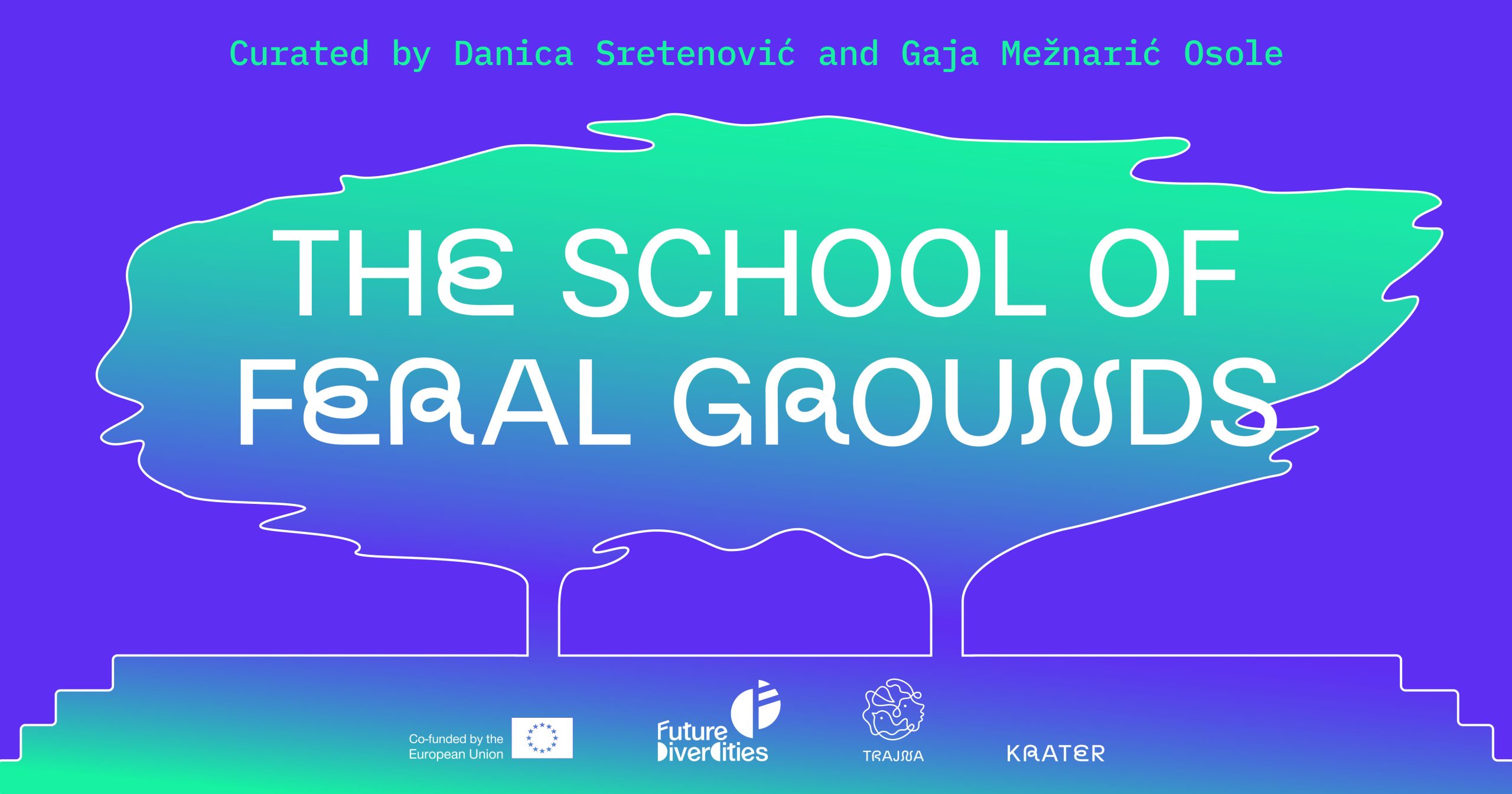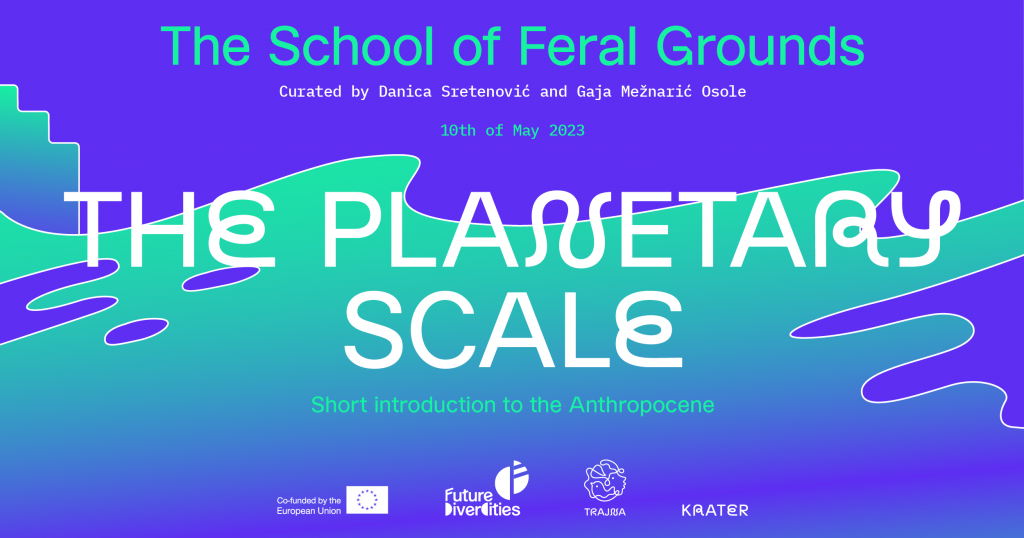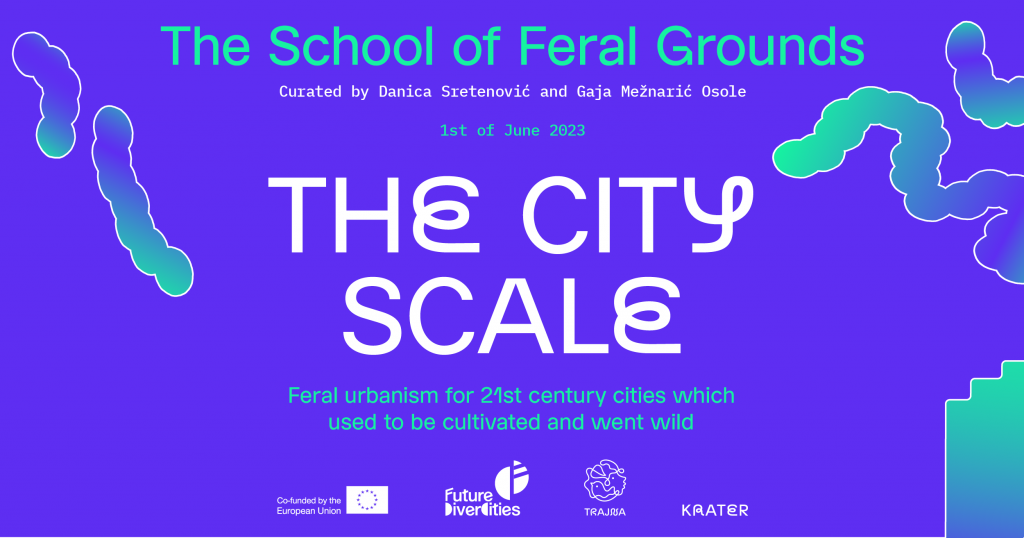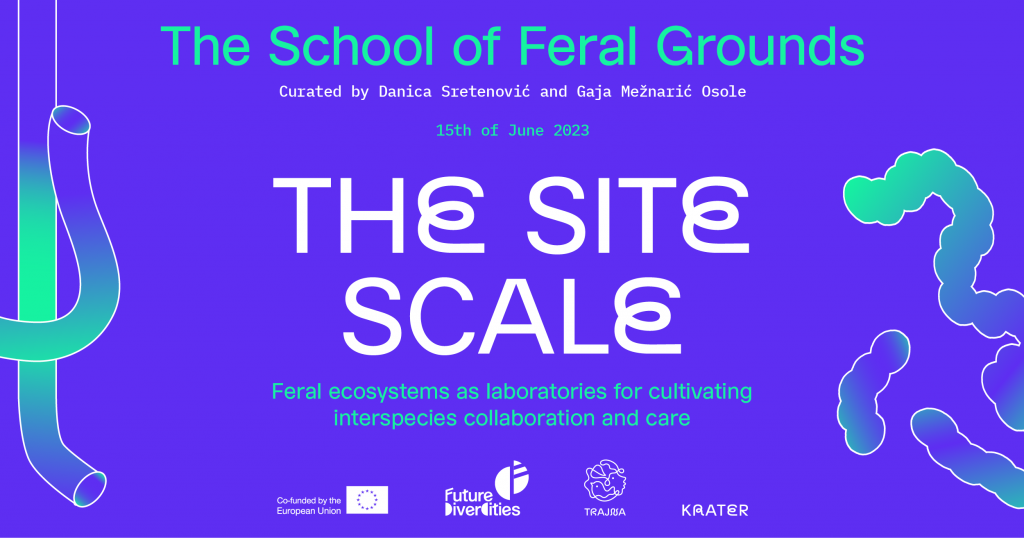Curated by Gaja Mežnarić Osole and Danica Sretenović.
Originally produced for Future DiverCities partners and their local coalitions to empower eco-social engagement with neglected cityscapes.
The School of Feral Grounds situates cultural practices in the world in which capital-driven economies act as geological forces, terraforming the earth into a place where climate change, social inequality, and species extinction call for urgent collective action. The school acts as a forum for interchange, where reflections, concepts, case studies, and generative exercises invite participants to position urban ecologies within the field of culture by interlinking common notions of the urban and ecology. To engage with the feral grounds of 21st century cities we take a close look at the practices between the development of neoliberal cities and nature’s capacity to reclaim their cracks.
Situated in the experience of running the production laboratory Krater and the Feral Palace urgent pedagogy, the school nurtures a collaborative learning environment for thinking and engaging with untamed urban sites. To support their eco-social regeneration, it works to enhance cultural workers’ capacities in regenerative place-making and place-keeping, artistic curation, programming, and advocacy. It consists of three study modules (SM) developed and run by architect and theoretician Danica Sretenović and eco-social designer Gaja Mežnarić Osole together with inspiring guest speakers working in visual arts, curation, activism, geography, and ecology.
SM1: Human impacts on urban ecosystems ━ offers interactive lectures and live conversations with experts on practices that look at human impact at various scales: planetary, city, and site-specific. The module provides a framework to acquaint participants with the conditions of our contemporaneity – of the Anthropocene;
SM2: Recontextualisation: tools of seeing site ecology and culture ━ a series of mapping and analysis exercises that explore the dynamics of the legal, organizational, more-than-human, and other constitutional bodies of the degraded sites in order to determine an in-depth location ID.
SM3: Designing for regenerative landscapes ━ a cycle of talks and discussions with invited artists, designers, (landscape) architects, and ecologists to navigate the production of tactics & strategies for designing regenerative interventions.
Upon commitment to the study programme, attendees will be asked to actively participate in learning sessions, discussions, and the production of documentation by contributing with feral maps, producing site-specific IDs, and developing regenerative tactics and strategies. The process of collective knowledge production will set the stage for an ‘international feral movement’ dedicated to identifying, valorising, and regenerating feral sites across Europe and beyond.
Trajna is a cultural organisation and interdisciplinary group of designers, makers, architects, and ecologists whose work focuses on restoring multispecies collaborations in urban ecosystems. Currently occupying 18ha of the feral urban ground Krater, the collective is set to produce environmentally conscious materials, infrastructures, and pedagogies to create new alliances across science, policymaking, and cultural production.
SM1: Human impacts on urban ecosystems
The Planetary Scale: Short introduction to the Anthropocene
Before delving into the specific topics of urban ecology, the introductory lecture offers a set of philosophical concepts, scientific findings, and situated observations for understanding the contemporary planetary condition – the Anthropocene. It’s hard to imagine that what we do locally has widespread influence across the planet, as we are not tuned to think at large scales. We need to learn how to recognise the entanglements and situate our cultural practices in the world in which human-led activities – more precisely capital-driven economies – act as geological forces, terraforming the earth into a place where climate change, species extinction, and non-human invasions call for our collective action.
Gaja Mežnarić Osole was in conversation with artist Debra Solomon and lawyer Aljoša Petek.
The City Scale: Feral urbanism for 21st century cities that were once cultivated and went wild
The lecture discusses often invisible though instrumental operations fueling urban inequalities – physical manifestations of neoliberal governance models and policies, protocols of land trade, and the lack of legislation acknowledging multispecies spatial rights. How to treat such knowledge as the object of cultural politics? To exercise urban ecologies as a viable alternative to the production of neoliberal cities we tracked recent histories of transformations of exemplary typologies of wastelands to re-examine categories including ownership, user, land use, programme and heritage; and the possibilities of subverting existing categories within cultural programming and from the multispecies point of view. In order to effect a paradigmatic shift in urban development, which is instrumental in bringing about social and environmental inequalities – such as pollution, extraction, devastation of biodiversity etc. – we opposed unlimited growth with feral tactics, in the process creating conditions for the new urban (ecologies).
Danica Sretenović was in conversation with artist Ibrahim Mahama and landscape architect Urška Škerl.
The Site Scale: Feral ecosystems as laboratories for cultivating interspecies collaboration & care
As a consequence of diverse political and economic conflicts, our post-industrial cities are seeing a rise in neglected urban environments (e.g. construction sites, houses, factories, roads etc.) reclaimed by nature. While invisible on planning documents, these largely overlooked yet highly productive green spaces have the capacity to regulate the climate, enhance biodiversity, provide irreplaceable ecological infrastructure, and give rise to research platforms for learning about eco-cultural regeneration. If the citizen’s role is often limited solely to the users and admirers of urban parks and forests, then these anthropogenic ecosystems, populated with invasive and other feral plants, human infrastructures, and fugitive compounds ask us for active, attentive engagement. They call for a new generation of care workers who know how to practice slow disturbance through the nurturing of interspecies collaborations. If we were able to recognise the educational, ecological, and cultural value of spontaneous ecologies, could we plan the city by integrating their vital existence into such schemes? Instead of treating them as precarious landscapes on the road to extinction at the hands of human-centric infrastructures, this lecture will explore feral ecosystems as creative laboratories of multispecies encounters and care.
Gaja Mežnarić Osole, Primož Turnšek and Danica Sretenović were in conversation with landscape architect Violeta Burckhardt.
Download supporting materials
SM3: Designing for regenerative landscapes
The School of the Feral Grounds‘ third and final learning module, Designing for regenerative landscapes, takes the form of a podcast series. Featuring inspirational guest speakers involved in urban curating, pedagogical work, publishing, art, design, and architecture, the series of thematic conversations are set to explore a variety of cultural approaches connected to ecological regeneration across diverse national contexts and spatial typologies. Despite the efforts of initiatives like the New European Bauhaus and EU policies to promote environmental sustainability, community-driven actions at the local level continue to face challenges such as precarity, ecological illiteracy, poverty, or disengaged local administrations. To work alongside the troubled terrains, each podcast episode delves into a specific topical lens with an invited practitioner, discussing creative approaches to bottom-up governance, ethical economics, critical publishing & education, planning for multispecies urbanism, and designing regenerative material cultures. By exposing social, ecological, and programmatic aspects of eco-cultural stewardship, the discussions aim to empower cultural actors across Europe to engage in resilient and continuous ecological actions.
PODCAST SERIES
#1 Curating ecological care & repair by Gilly Karjevsky, Floating University
For the opening conversation, Gilly Karjevsky will delve into curatorial approaches and formats rooted in ethics of care for our communities, our cities, and the planet. Derived from the word ‘curare,’ meaning ‘to cure,’ Karjevsky will offer radical imaginaries on tending to and healing our fractured relationships within urban ecologies by repositioning curatorial practice outside traditional institutional frameworks to engage with site-specific, multispecies contexts.
Gilly Karjevsky is an urban curator based in Berlin. Her current research focuses on Collective Autotheory and urban curating post-planetary turn. As a guest professor for social design at HFBK in Hamburg and curator in residence at the MArch at CSM in London, Gilly brings a wealth of knowledge to the table. She’s also been a founding association member at Floating e.V since 2018, where she curates the Climate Care festival.
Hosted and curated by Gaja Mežnarić Osole and Danica Sretenović.
Produced by Görkem Özdemir.
Music by Ida Hiršenfelder (beepblip), “Voluminous Movement of a Watery Earth” excerpts (2024)
The comments contained in this podcast are those of the authors and do not necessarily reflect the opinion of the Future DiverCities Consortium.
Click here to listen.
#2 Multispecies urbanism department with Debra Solomon
While recording the podcast series in mid April Ljubljana, we transitioned from summer to winter in just 4 hours, highlighting yet another reason why robust ecosystems in our cities are crucial for combating the climate extremes ahead. In a conversation with infrastructure activist Debra Solomon, we discuss the imperative for new forms of just urban development and spatial practice that foster reciprocal relationships between humans and more-than-humans. The discussion delves into speculative fabulation, envisioning a scenario where every European city establishes a department for multispecies urbanism to respond to the intersecting challenges of climate change and democracy. By addressing topics like ecosystem defragmentation and biodiversity corridors, more-than-human water purification, soil organism and its remediation, decommodification of food and more, the department engages with diverse locations across Europe, showcasing the conceptualization and implementation of a multispecies sensible public administration in locations like Kuopio, Liepāja, Marseille, Athens, and Londa.
Debra Solomon (NL) is an artist and infrastructure activist with over 25 years of experience in public space. Her work merges art, infrastructure activism, and social sciences, focusing on biodiversity, climate crisis, and the multispecies right to the city and subsequent right to the urban metabolism. In 2019, Solomon coined the term multispecies urbanism and showcased the concept in the Dutch Pavilion at the 2021 Venice Architecture Biennial. Currently pursuing a PhD in Urban Planning at the University of Amsterdam, Solomon is also the founder of Urbaniahoeve – Social Design Lab for Urban Agriculture. Since 2010, Urbaniahoeve has been involved in critical spatial practices centered on interspecies care relations and biodiversity production. Urbaniahoeve’s current project is the 56-hectare Amsterdam Zuidoost Urban Food Forest, (called VBAZO) in Amsterdam Zuidoost. VBAZO is produced by the Urbaniahoeve collective (Debra Solomon and Renate Nollen) with local human and more-than-human communities.
Hosted and curated by Gaja Mežnarić Osole and Danica Sretenović.
Produced by Görkem Özdemir.
Music by Ida Hiršenfelder @beepblip, There is still hope in life excerpts (2024).
Click here to listen.
#3 Designing economic cultures with Bianca Elzenbaumer
What happens when a designer shifts her focus from creating objects and graphics to designing economic cultures? By choosing not to engage in representational design activities, produce prestigious exhibitions, or build her career in prominent academic positions, Bianca Elzenbaumer’s daily commitment to social change in the Vallagarina valley attracts (young) people to stay. Discover how her 40-year project vision transforms disturbed Alpine valleys into vibrant rural settings through fizzy drinks production, a mobile pizza oven, situated pedagogies, and groundbreaking research into land commons. In the face of escalating climate change, biodiversity decline, and social isolation, she leverages the community economy theories of feminist geographers J. K. Gibson-Graham to reshape economic practices and improve the livelihoods of all living beings.
Bianca Elzenbaumer is a feminist design researcher based in the Italian Alps and a founding member of the design practice Brave New Alps and of the community academy La Foresta. She is a member of the Community Economies Institute. From 2021 to 2023 she was the co-president of the International Commission for the Protection of the Alps. Her 40-year research plan focuses on supporting and creating community economies and commons starting from the places she lives in. She completed her doctorate at Goldsmiths, University of London, in 2014. She holds an MA in Communication Art & Design from the Royal College of Art and an MA in Mediation and International Peacebuilding from the University of Bologna.
Hosted and curated by Gaja Mežnarić Osole and Danica Sretenović.
Produced by Görkem Özdemir.
Music by Ida Hiršenfelder @beepblip, There is still hope in life excerpts (2024).
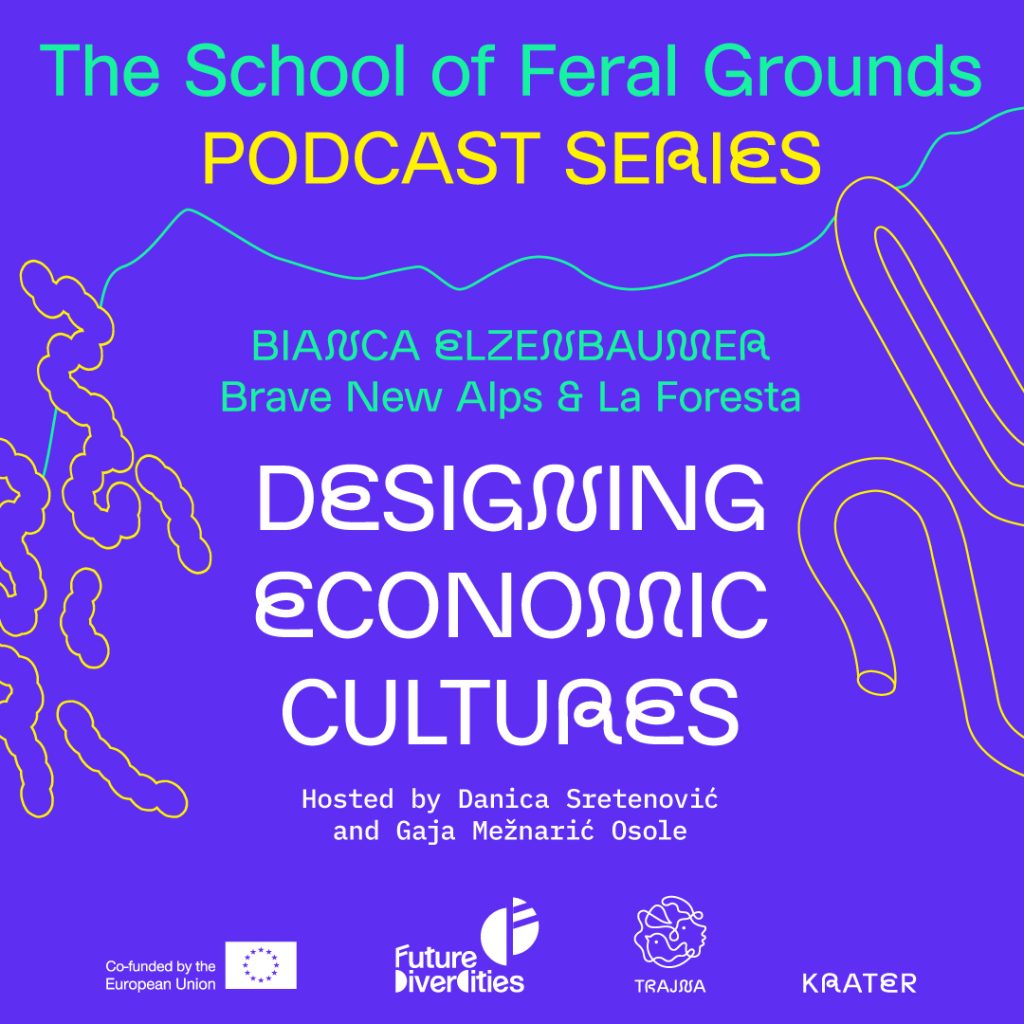
Click here to listen.
#4 Stockholm’s Banquet of Feral Occupations – Mechanisms of Protection
The Banquet of Feral Occupations premiered at Krater in 2023, where we served complex discussions alongside delicious food, asking a diverse group of public figures — including university professors, fellow artists, activists, and directors of cultural institutions — to collectively explore the shared responsibility of maintaining Krater. The Banquet originated as part of a Feral Occupations, a series of artworks featured at the Graphic Biennial in Ljubljana, occupying guests with questions on the production of public goods: public land, public discourse, public workplaces, public ecologies.
As Krater’s concerns are neither isolated nor coincidental, this time, we are inserting feral seeds in the halls of IASPIS, the Swedish Arts Grants Agency, with similar intentions: to serve Balkan Fika alongside an urgent call to rethink mechanisms of land protection.
In Stockholm, guests were invited to consider what kinds of feral strategies, within the existing frameworks of art, cultural heritage, nature protection, and institutional regulations — we dare to imagine in advocating for the land, its pioneering ecosystems, and its cultural practices. As a consequence of systemic flaws shared across geographies, our common learnings aim to provoke feral actions beyond the Krater site.
Our reporter, Bitsy Knox, moved through the Banquet, capturing fragments of conversation, followed by commentary from one representative per topic.
We want to extend our gratitude to all Feral Banquet guests and special thanks to the contributors of the podcast. By order of appearance Inna Zrajaeva, Elena Carlini, Robert Gioielli, Corina Oprea, Jonas Dahlberg, Eric Andersson, Josse Thuresson, Evelina Mohei, Paola Torrez Nunez del Prado, Poppy Bell, Munish Wadhia, Sarasvati Shrestha
Hosted and produced by Bitsy Knox from Cashmere Radio
In collaboration with IASPIS
Curated by Danica Sretenović and Gaja Mežnarić Osole
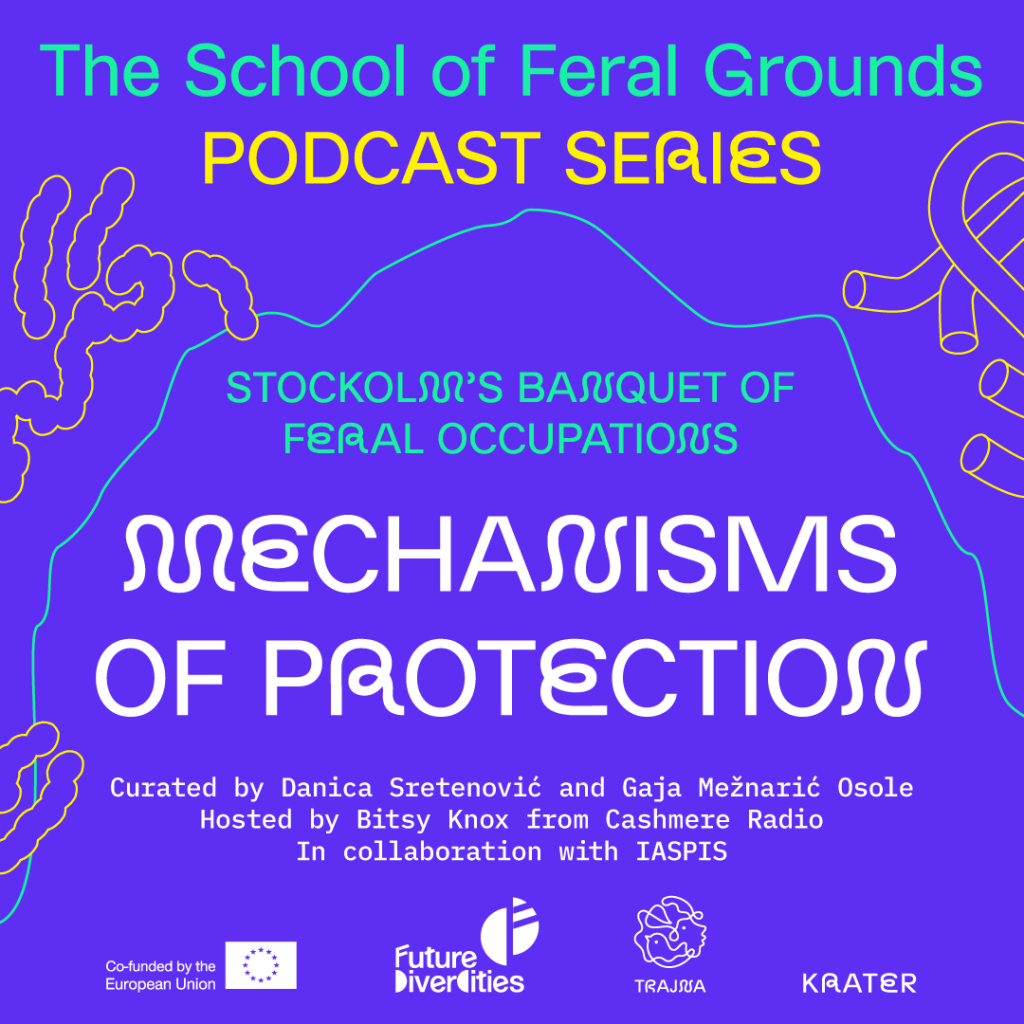
Click here to listen.

